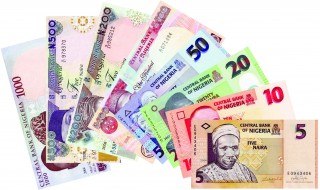The Nigerian Naira fell to 360 against the United States (US) Dollar in the parallel market as the supply of the hard currency has waned in the foreign exchange market (forex).
The Naira has experienced great volatility since the start of the week as the shortage in supply of the greenback has affected its value on the parallel market. On the parallel market, the Naira closed at N348 on Friday, hovered around N351 and N354 on Monday and Tuesday respectively, before falling to N360. Foreign market analysts believe that the increased volatility of Nigeria’s Naira is as a result of the dollar scarcity both in the interbank and forex markets. “It all comes back to liquidity, that is what drives the market,” said the Mr. Temi Popoola, Chief Executive Officer, Renaissance Capital Nigeria. “It is basically one thing – the supply side; activities are still currently low at the interbank market. Nothing much is really happening on the supply side of the market. Liquidity issue is still there. We actually felt that foreign investors should have been coming in by now,” said Mr. Kunle Ezun, currency analyst at Ecobank Nigeria.
The shortage of the greenback is likely to stem from market speculators, and shortly after the Central Bank of Nigeria (CBN) left the currency market to the natural forces of demand and supply, to the delight of international markets,there have been calls across the board for CBN to intervene in the interbank market. Yinka Oyinola, a former executive at the World Bank, explained that a notion for the CBN not to intervene in the markets implies that the markets regulate prices in a rational manner and do not depend on contextual variables; both of which do not play out in practice. The last 18 months have shown that a fixed exchange rate is unsustainable, but the CBN needs to intervene in periods of volatility. “The CBN should only intervene in the market when things are going out of control. But government should make policies to minimise the intervention of the CBN. The risk associated with a fully-deregulated market is that if the market goes haywire, prices of goods will hit the roof. This is because of the peculiarity of the Nigerian economy, which is largely driven by the dollar. Anything that affects the dollar affects the prices of goods,” said Prof. Simon Irtwange, President of the Chartered Economists of Nigeria.
However, others believe that the market can be supplied with forex independent of the CBN. Some commentators argue that the Bureau De Change distribution channels should be improved to distribute forex effectively, while others highlight the importance of sourcing liquidity through remittances, portfolio investors and foreign direct investments. But CEO, Renaissance Capital, Temi Popoola comments that there is a price level needed to get liquidity into the market through the aforementioned.








